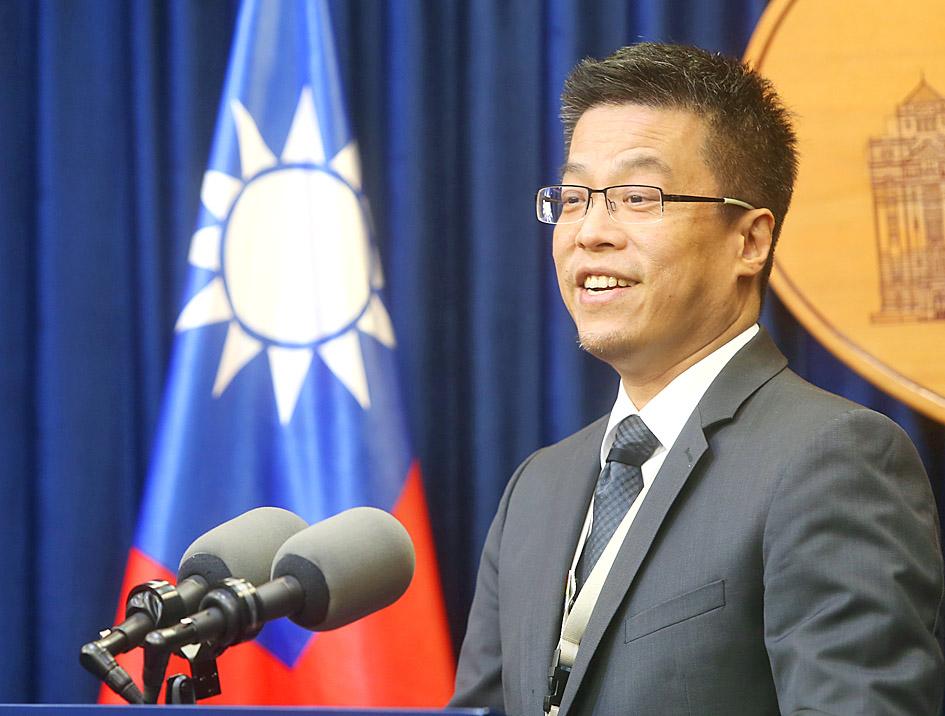Former legislative speaker Su Jia-chyuan (蘇嘉全) is to become the Presidential Office secretary-general when President Tsai Ing-wen (蔡英文) begins her second term tomorrow, Presidential Office spokesman Alex Huang (黃重諺) said yesterday.
The announcement came after Presidential Office Secretary-General Chen Chu (陳菊) on Sunday said on Facebook that she would be leaving her post tomorrow.
Reportedly, Tsai is to nominate Chen as president of the Control Yuan.

Photo: CNA
Huang yesterday said that Su has plenty of political experience, having previously served as a legislator, Pingtung County commissioner and Council of Agriculture minister, among many other positions, adding that he would be a great asset due to his expertise in facilitating communication between the public and the government.
Financial Supervisory Commission Chairman Wellington Koo (顧立雄) is to replace David Lee (李大維) as National Security Council secretary-general, while Lee is to become chairman of the Straits Exchange Foundation, Huang said.
Executive Yuan spokeswoman Kolas Yotaka is to become the Presidential Office spokeswoman, while National Security Bureau Director-General Chiu Kuo-cheng (邱國正) would continue in his role, he added.
Cabinet sources said that Vice Premier Chen Chi-mai (陳其邁), Executive Yuan Secretary-General Li Meng-yen (李孟諺) and Executive Yuan Deputy Secretary-General Ho Pei-shan (何佩珊) would stay on in the same positions.
Seven ministers without portfolio — Lin Wan-i (林萬億), Wu Tse-cheng (吳澤成), Chang Ching-sen (張景森), John Deng (鄧振中), Kung Ming-hsin (龔明鑫), Lo Ping-cheng (羅秉成) and Audrey Tang (唐鳳) — would also be staying, they said.
Executive Yuan Senior Secretary Ting Yi-ming (丁怡銘) would become Cabinet spokesperson, they added.
In other developments, former president Ma Ying-jeou (馬英九), of the Chinese Nationalist Party (KMT), said that while he had received an invitation to Tsai’s inauguration tomorrow, he would not be attending.
Over the past four years, Tsai has not done “what a Republic of China president should do,” he said.
The nation is regressing in areas including freedom, democracy, human rights, rule of law and the economy, he said, adding that he is concerned because Taiwan has no opportunity to join regional economic agreements such as the Comprehensive and Progressive Agreement for Trans-Pacific Partnership and the Regional Comprehensive Economic Partnership.
KMT Chairman Johnny Chiang (江啟臣) also said that he would not be attending the inauguration.
Additional reporting by Chen Hsin-yu

POSITIVE DEVELOPMENT: Japan and the US are expected to hold in-depth discussions on Taiwan-related issues during the meeting next month, Japanese sources said The holding of a Japan-US leaders’ meeting ahead of US President Donald Trump’s visit to China is positive news for Taiwan, former Japan-Taiwan Exchange Association representative Hiroyasu Izumi said yesterday. After the Liberal Democratic Party’s landslide victory in Japan’s House of Representatives election, Japanese Prime Minister Sanae Takaichi is scheduled to visit the US next month, where she is to meet with Trump ahead of the US president’s planned visit to China from March 31 to April 2 for a meeting with Chinese President Xi Jinping (習近平). Japan and the US are expected to hold in-depth discussions on Taiwan-related issues during the

‘LIKE-MINDED PARTNER’: Tako van Popta said it would be inappropriate to delay signing the deal with Taiwan because of China, adding he would promote the issue Canadian senators have stressed Taiwan’s importance for international trade and expressed enthusiasm for ensuring the Taiwan-Canada trade cooperation framework agreement is implemented this year. Representative to Canada Harry Tseng (曾厚仁) in an interview with the Central News Agency (CNA) said he was increasingly uneasy about Ottawa’s delays in signing the agreement, especially as Ottawa has warmed toward Beijing. There are “no negotiations left. Not only [is it] initialed, we have three versions of the text ready: English, French and Mandarin,” Tseng said. “That tells you how close we are to the final signature.” Tseng said that he hoped Canadian Prime Minister Mark Carney

President William Lai (賴清德) yesterday bestowed one of Taiwan’s highest honors on Saint Vincent and the Grenadines (SVG) Ambassador Andrea Clare Bowman in recognition of her contributions to bilateral ties. “By conferring the Order of Brilliant Star with Grand Cordon on Ambassador Bowman today, I want to sincerely thank her, on behalf of the Taiwanese people, for her outstanding contribution to deepening diplomatic ties between Taiwan and SVG,” Lai said at a ceremony held at the Presidential Office in Taipei. He noted that Bowman became SVG’s first ambassador to Taiwan in 2019 and

A man walks past elementary school artworks at the Taipei Lantern Festival in Ximen District yesterday, the first day of the event. The festival is to run from 5pm to 10pm through March 15.